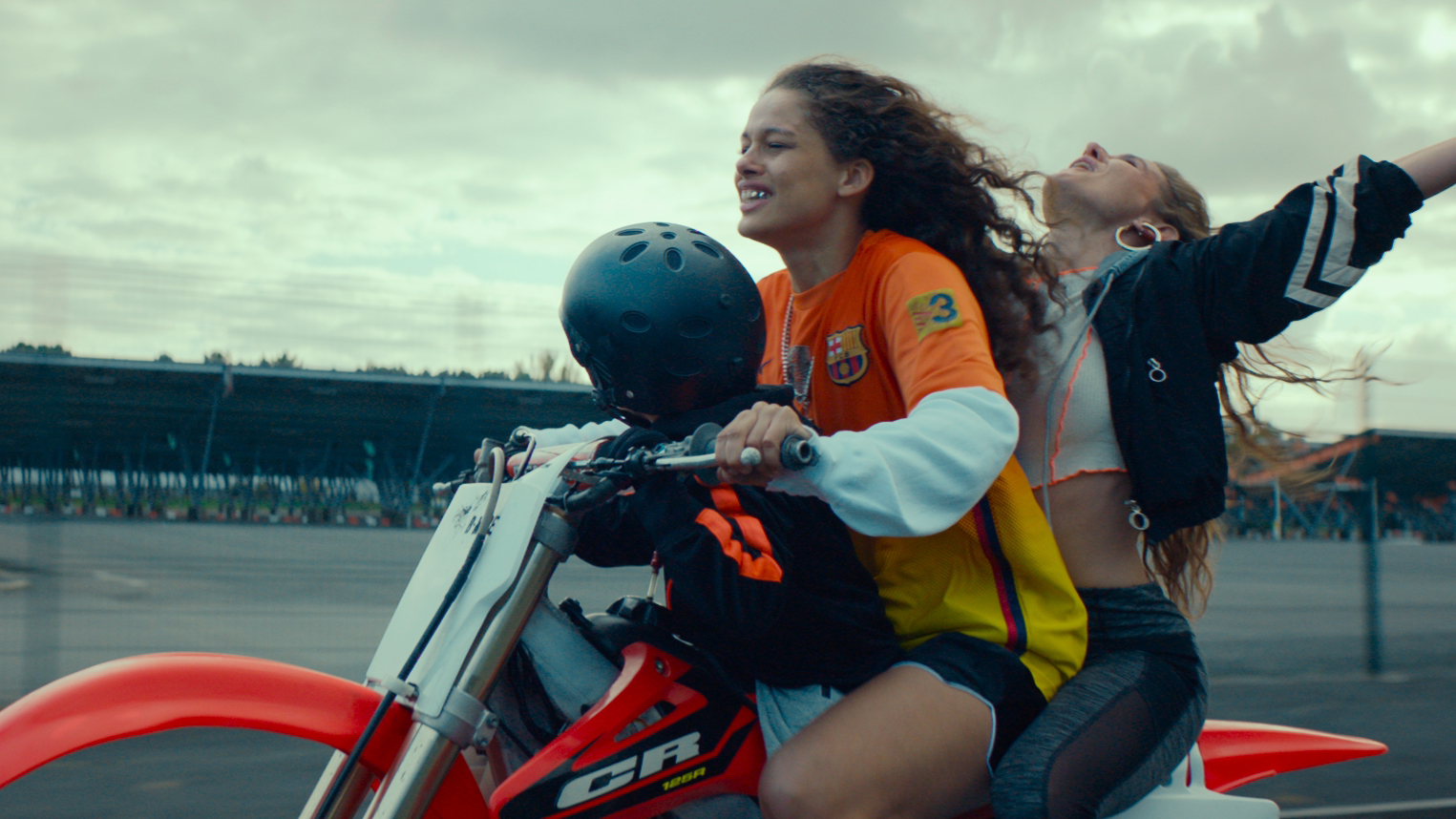It’s as well-worn a trope as any in the coming-of-age genre: the elusive, underground subculture that draws in a young protagonist, whose discovery of this world helps them learn more about themselves in the process. Director Lola Quivoron’s latest feature Rodeo, an Un Certain Regard prize winner at last year’s Cannes, mercifully sidesteps such cliches in its exploration of a motocross community that exists just off the fringes of suburban Paris. Unfortunately, this is because it becomes overly formulaic in a different way, very quickly transforming into a familiar tale of a young person’s indoctrination into a criminal gang and lacking enough depth in cultural specificities of its surrounding world to ever truly stand out.
This is something of a surprise––Quivoron has spent extensive amounts of time in the cross-bitume community, which previously formed the backdrop for her 2016 short Au Loin, Baltimore, another tale of a young bike-riding dreamer facing cold reality when their vehicle breaks down. But for all the impressive stunt work we catch glimpses of when we’re introduced to this world of urban motocross alongside protagonist Julia (Julie Ledru), this soon fizzles into the background in favor of something far more ordinary. The milieu reveals itself to be nothing more than a novelty to help a very familiar Euro arthouse tale––pitched somewhere between the bleak realism of the Dardennes’ L’Enfant, and a more stylized Jacques Audiard criminal character study––briefly suggest it has something more to offer.
This is not a fault of Ledru’s lead performance, a captivating screen debut and the single reason Rodeo is still worthy of some attention, even if we’ve been down this track many times before. We’re introduced to her character, Julia, shortly after her bike is stolen, a feat her family blame on the fact that trouble seems to follow her wherever she goes. Feeling as distraught as if she’d lost a child––she at one point comments that she was “born with a bike between (my) legs”––she locates a rube on eBay selling a new model and poses as a potential buyer before stealing it, flipping the bird back at its former owner as she zooms off to find other like-minded bikers.
Not long after this opening stretch does it become clear Julia is more magnetic than the film around her, with Ledru’s chameleonic performance brilliantly capturing a young person in the midst of an identity crisis. Upon introducing herself to other riders in the suburbs, Julia opts to go by the moniker “Unknown,” a move that makes sense considering the bewilderment and hostility that greets her showing up and asking for fuel in a place where women are largely assumed to be standing on the sidelines, watching their boyfriends do stunts. The sexism of this world is always apparent––spot one biker’s boorish reaction when she offers help after an injury––yet Julia becomes such a subject of fascination that she’s welcomed into the B-Mores, a group who show a few tricks of the trade.
That Rodeo turns more complex than the simplistic study of a young woman aiming to live out her dreams in a field dictated by men is testament to Ledru, something of which Quivoron seems innately aware. Just look back at that early sequence, the first of several where she steals a ride, and how it never shows the face of the victim realizing he’s just had his prized possession stolen––the director wants us to fixate entirely on the changes in a deliberately unknowable gaze, how it leaps from charismatic to withdrawn depending on the situation to which it must acclimate. It’s a performance demanding attention even as the film around her operates on an increasingly familiar formula, especially after introducing a bike-theft ring adjacent to this world, of which she is very expectedly thrown into.
Julia remains a fascinating protagonist because she remains seemingly unflappable, adaptable to (and perennially unreadable in) hostile situations, more than earning her “Unknown” nickname. It’s a shame the film relies on the strength of this performance, unsatisfying in its overly familiar exploration of a woman thrown into a hyper-masculine culture. As it progresses it becomes increasingly reliant on introducing several overplayed character tropes as a means of exploring this further, most notably the wife of an incarcerated crime boss (played by co-writer Antonia Buresi) given extensive screen time largely to show how women are expected to function in this world.
As we plunge deeper into the third act, plot begins gravitating around the kind of heightened “one last job” you’d expect from Hollywood action movies, which only renders the arthouse grit so much more artificial; you don’t have to stretch your imagination too much to imagine David Ayer directing a U.S. remake. Rodeo is caught between arthouse character study and stylish heist thriller, the two genres never making for easy bedfellows. For all its merits, not even a commanding lead performance can thread these two disparate tones.
Rodeo opens on Friday, March 17.

